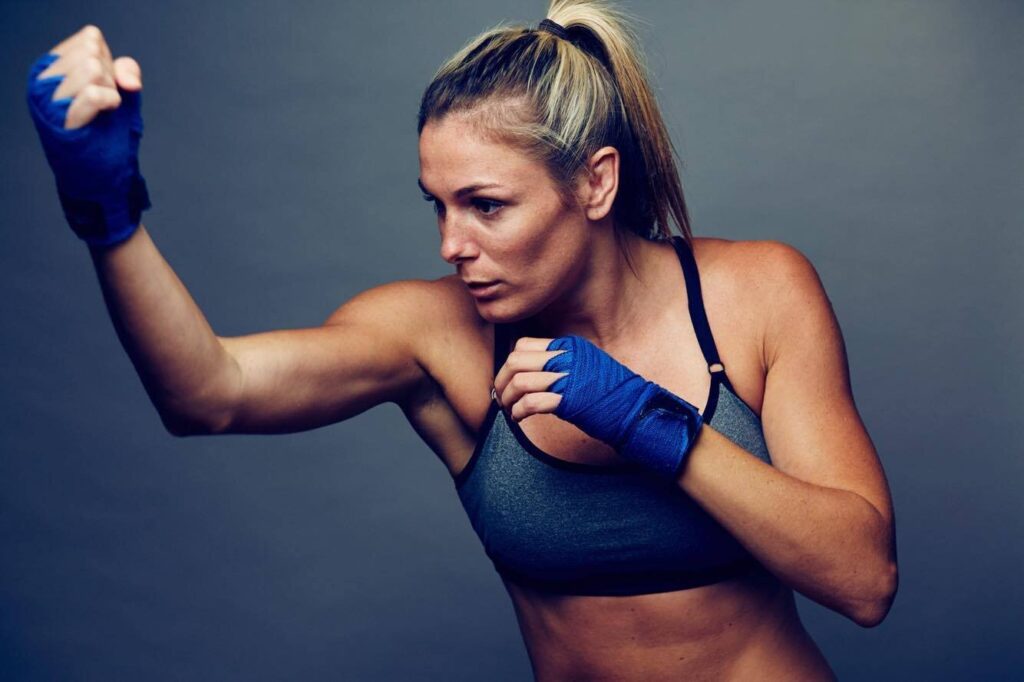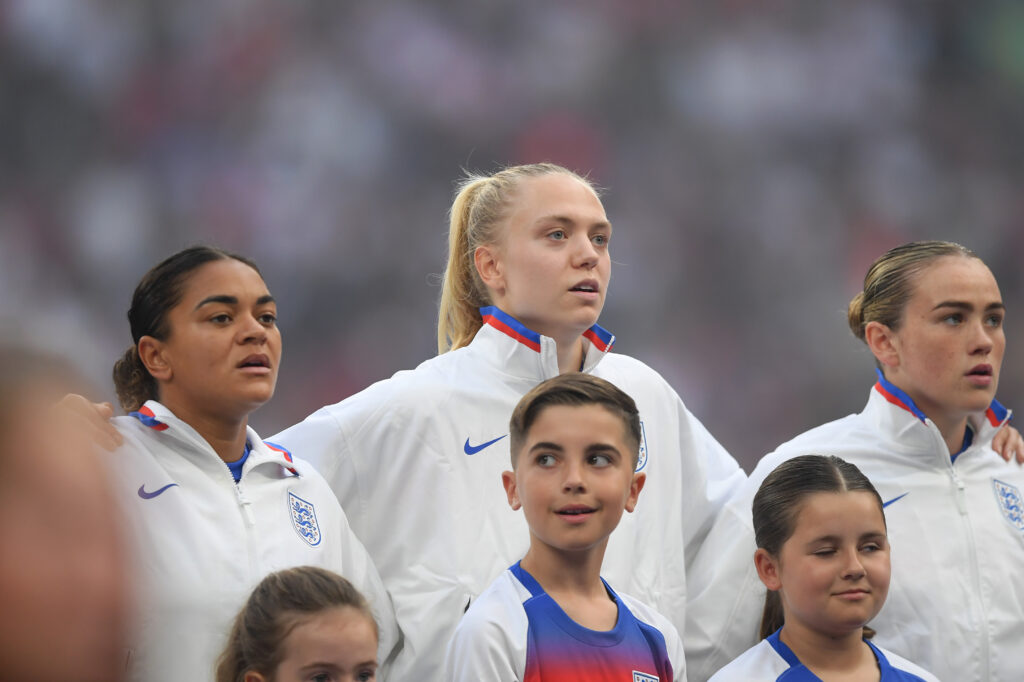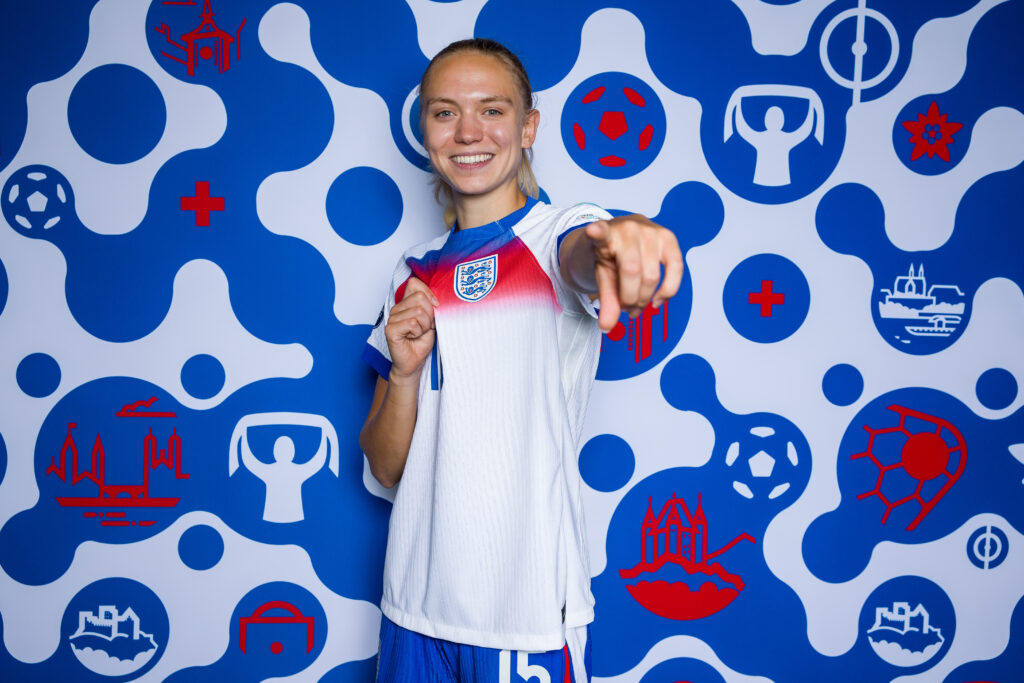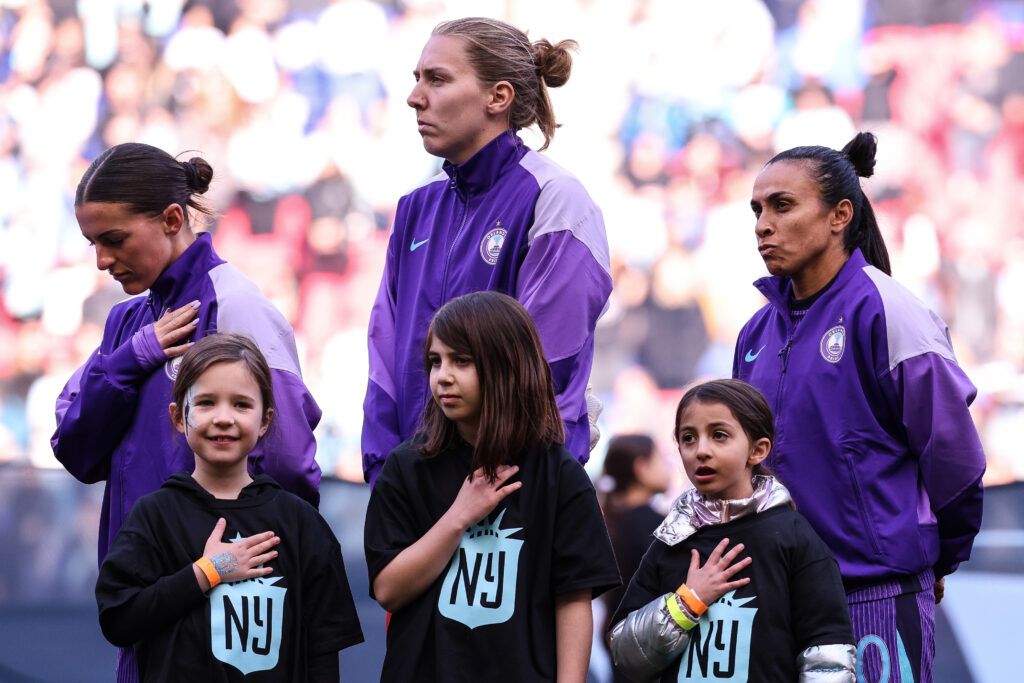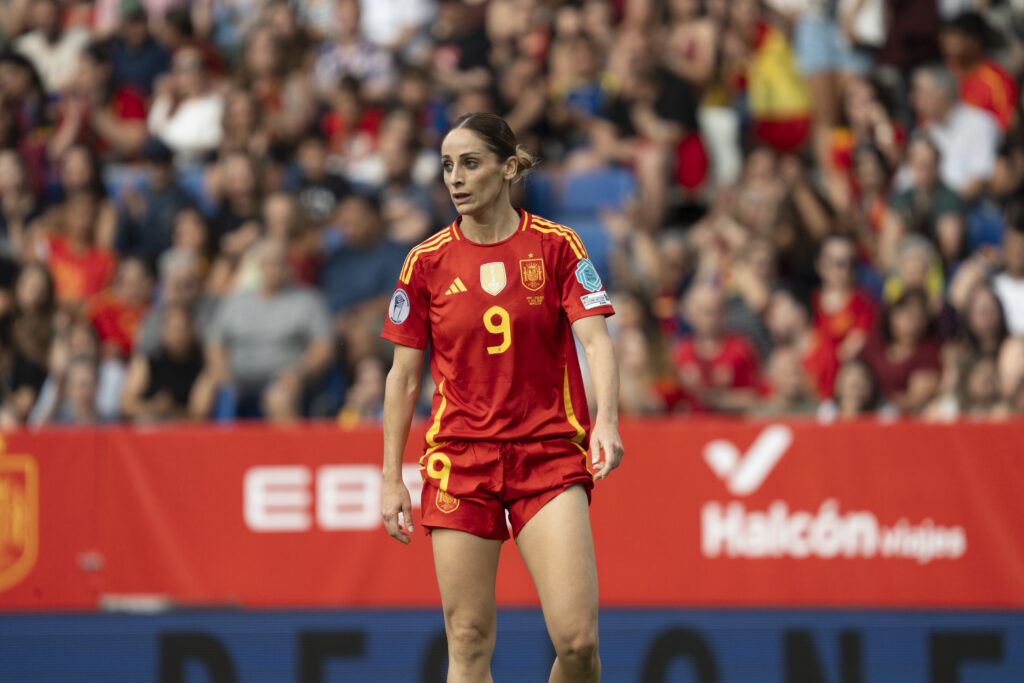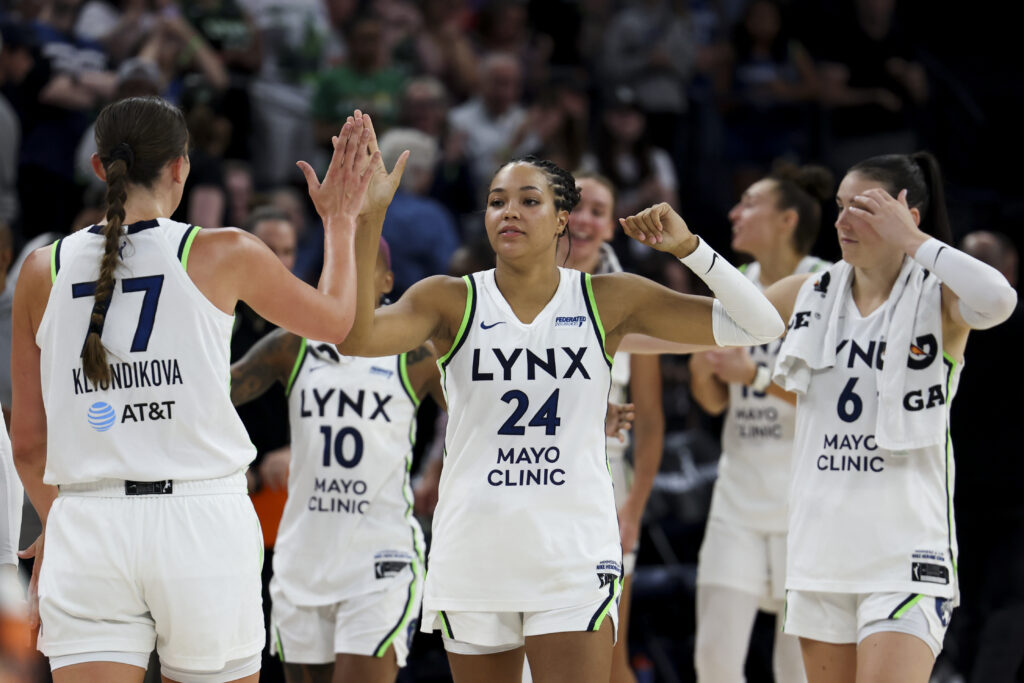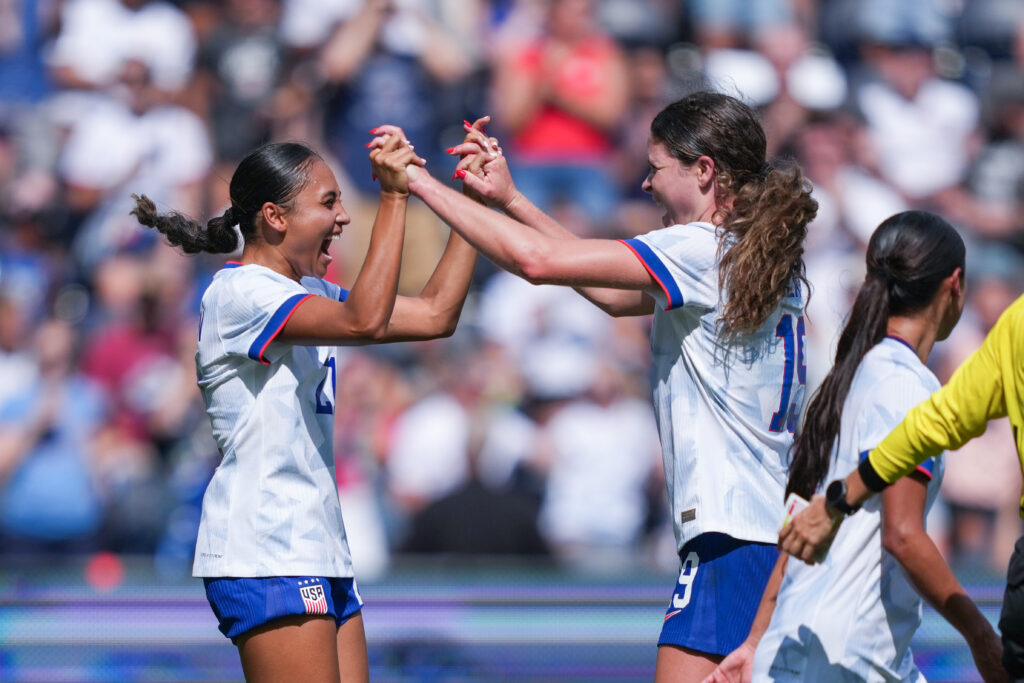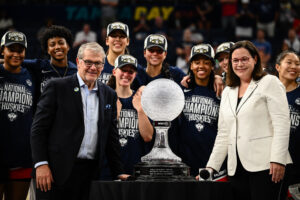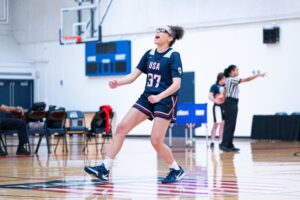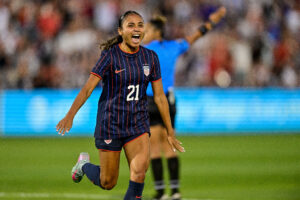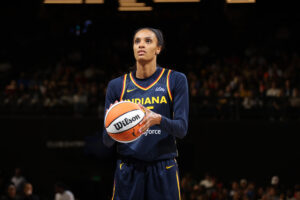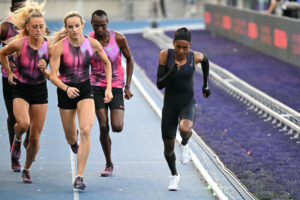Sarah Thomas is boxer from Bethpage, New York, fighting out of Academy of Boxing in Huntington, New York. She began her combat career as a kickboxer, with an undefeated record. During her amateur career, she won the Ringmasters (formally Golden Gloves) tournament. Her professional boxing debut was delayed due to COVID-19. As a sports science graduate student who also trains younger boxers, she’s managed to keep busy in the meantime, even as much of her day-to-day has shifted online. Below, she spoke with Just Women’s Sports about how she discovered boxing, the importance of mental health, and what it’s like competing in a male-dominated sport.
What originally led you to boxing as a sport?
I’ve always been more aggressive in sports. I actually played lacrosse in high school, but I would get kicked out of every game. I didn’t really actually know how to play lacrosse, to be honest, but I was just athletic, so my friends were like, “Yeah, join.” I just got in trouble every single game, because I was just charging directly at people. I was just the worst lacrosse player ever. And then I liked the idea that boxing was an individual sport. In an individual sport like boxing, I couldn’t blame anyone else. I liked that a lot.
I didn’t actually start until I was 20 though, and I’m 30 now. I first competed in kickboxing, but then my coach left. He told me he was in the FBI and that he was getting re-stationed. I didn’t even know he was in the FBI. So after he disappeared, I went to another gym, and I was dabbling with MMA for a little, but I realized I liked the boxing aspect the most out of all of it, so I decided to just stick with boxing. I like kickboxing, but I don’t actually like getting kicked. With boxing, I can focus on one thing, and I like practicing the same thing over and over, which I feel like a lot of people don’t like. I like the idea of, “I’m going to do the same thing a thousand times so I get good at it.”
How did you first realize you had a talent for combat sports?
I took kickboxing just to try it out and as a workout. I went to the gym, took one class, and was like “All right, I really want to fight.” The coach wouldn’t train me because he had never trained a girl, like all those movies, and then finally he decided he would.
20 seems late. At what age do women usually start their professional careers?
Usually it seems that women start later in life. Really, you can turn professional whenever you feel ready, but the licensing to become a pro varies by state. So you just have to be able to pass the medicals and everything, and then you have to find a promoter who wants you. You have to find someone who likes you, and as a woman, you just have to be marketable. I have noticed that with women’s combat sports, what you look like goes a long way, as sad as that is. It’s like you either have to look good or just be so good that you’re almost some freak.
I wanted to ask you, what is it like being a female in what many would consider to be a male-dominated sport?
I feel like it was harder in the beginning of all of it, and now there’s a lot more girls than there were before. I feel like every year continuously gets easier and there’s more acceptance. At first, it was really hard for me to find fights. I couldn’t just turn professional without having enough experience. But then the people who were amateur, they were few and far between, and they wouldn’t compete against me. I couldn’t gain experience to get better because I couldn’t really get matched up, so it was hard in the beginning with that.
With boxing, actually, in the ’90s it was really popular for women. That was during the time of Laila Ali. And even before then, it was popular for a little while, and then it fell off. It resurged again recently because it was allowed to be in the 2012 Olympics.
How would you describe the popularity of the sport now?
I think Ronda Rousey, even though she’s MMA, really helped make women’s combat sports more popular. And then also Claressa Shields won the Olympic gold in 2012 when women were allowed in the Olympics, and she won it in 2016. I think she brought the popularity back, and there’s been a few other girls who have made women’s boxing popular again. Now women are actually getting paid. I was actually going to have my professional debut on May 8th, but that didn’t happen because of COVID.
Do you have Olympic aspirations?
I had thought about it at one point, but the weight class I was competing at wasn’t in the Olympics. I sort of just wanted to go pro because I had kickboxed for a while, and when I made the decision to just focus on boxing, I had enough combat sport experience where I wanted to just be a professional rather than spend a lot of time as an amateur. And once you’re professional, you can’t compete in the Olympics.
Can you talk a little bit about how you manage to stay in shape, stay healthy and stay motivated while participating in such a punishing sport?
There used to be times when I would do three-a-days, which is so stupid, but I thought that more was better. I actually train less now, and I feel stronger now than I did, which is weird. I think I was over-trained for a long, long time. So now that I’m older and I train less and eat whatever I want, I actually feel stronger. I actually eat pretty clean, but I don’t count with macros and I don’t count calories or any of that. I honestly just eat whenever I feel like I want to. So if my body is like, “All right, I’m hungry,” I’ll eat. And I don’t do it according to a science or anything, I just try to stay healthy.
I’m sure there’s going to be a point where I feel like I’m getting weaker than I was, and I guess that’s when I’ll know that I’m on the downswing, but I feel like I’m still getting stronger, so for now I’m good. And I notice that with women in fight sports, it seems like a lot of them are older. There’s some girls that are still pros that are in their forties. It’s kind of crazy. I think it’s one of those sports where you can be older as a female.
How important is mental health to you in boxing?
I’ve had anxiety and OCD since I was really little. The first time I ever noticed that I had OCD, I was eight. It’s a really weird thing to understand. I don’t know how to describe it, but basically it’s like an extreme form of anxiety where you feel like you have to do certain rituals to overcome bad things. Your brain tries to cope with the anxiety through some sort of action, and then you can also have thoughts and the thoughts can keep you up. It’s basically anxiety on steroids, and yeah, I’ve dealt with that since I was little. I always felt from a young age the only time I wouldn’t really notice a symptom of that would be when I was playing sports. So when I played soccer I would never notice that, because I’d be so in the moment that I wouldn’t be able to worry about anything else besides that moment, and boxing’s very much like that. Your head really can’t be anywhere else, because you’re so worried about defending yourself and throwing punches that you’re not thinking about whether you paid your credit card bill or something that gives you anxiety. It’s helped a lot. Honestly, it’s like my version of a drug. If I hadn’t found sports, I don’t really know where I would be. It helps me tremendously in coping with my anxiety. And I’m very open to talk about all of that, because anytime I say, “I have anxiety,” almost everyone that I say it to is like, “Me too.”
I imagine a lot of athletes view sports in a similar way. I have to ask, have you ever had any terrible injuries from boxing?
So in kickboxing, I actually broke my foot, but I didn’t know I broke my foot until after because of the adrenaline. I thought I broke my toe, and then after my fights I saw that my bone was sticking through my skin. I had to have surgery, because that kind of break doesn’t just heal on its own. And then I’ve broken my nose, but it wasn’t from getting hit. A girl accidentally headbutted me. That was not fun. And then besides that, surprisingly, not really.
I’ll have minor things, like maybe my wrist will hurt for a week and I’ll just rest it, or my knees would hurt for a week from running a lot, but then I just rest them. Nothing serious. I’m sure if I got an MRI of my entire body it wouldn’t be pretty though. I have disc issues too. I feel like that is from ten years of combat sports, but I don’t know. Nothing that gives me a lot of pain or anything.
Speaking more generally, how do you recover from a typical fight?
I stopped doing this, but what I used to do is I would cut too much weight, and then I would compete, and then after the competition I would eat everything in sight and just drink lots of Gatorade and lay in my bed for two days and that was it. I mean, I’ve never really had any crazy recovery, but I actually changed weight classes because one time, two fights ago, I cut too much weight and I had to get IV fluid after, and then that’s when I finally was like, “All right, I’m getting older. My body’s not going to allow me to continuously drop this weight, so I’m just going to move up in weight and feel better and not have to worry about weight cutting anymore.”
Do you have any favorite memories or fights from your career that stand out?
I won Golden Gloves, which was fun. I think that was my favorite. I actually got no sleep the night before, and I had just broken up with this guy I was dating, and it was a really crappy time in my life. But I was just like, “Screw this, I’m winning.” And I won the whole tournament, and did it on no sleep. I felt like it was all in my brain mentally because I wasn’t even able to train the way I wanted to, but I just convinced myself that I was going to win, and it gave me confidence.
Looking ahead, what do you see for yourself in terms of moving forward in your professional career? Do you see yourself competing for a long time?
Honestly, I can’t really pick an end date, but I feel like I would just do it until I felt like my body wasn’t right. If I ever took like a head injury, I would leave too. I’ve never been knocked out or anything, and I think that’s something that would stop me. Because I don’t want to have brain damage.
